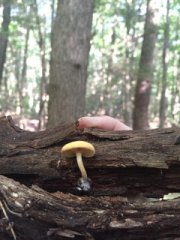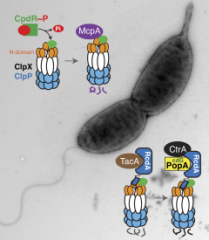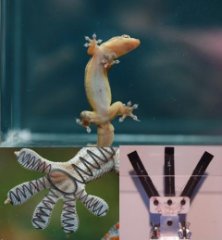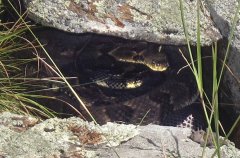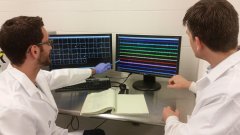News Highlights
How Biotechnology Innovations are Transforming Pharmaceutical Research
How Biotechnology Innovations are Transforming Pharmaceutical Research
Special MCB Colloquium in Collaboration with the Office of Professional Development
Monday, November 30th - 12:00pm-1:15pm
1634 Lederle Graduate Research Tower (LGRT)
Alexion Pharmaceuticals is a global biopharmaceutical company focused on developing and delivering life-transforming therapies for patients with devastating and rare diseases. Dr. Michael Perricone, Exec. Dir., Global Research Strategy & Operations, will discuss the launch of a new laboratory focused on network medicine to advance Alexion’s mission. He will share insights about the science behind the initiative and describe how other innovation initiatives are poised to disrupt traditional drug development processes and deliver more drugs to patients. Co-sponsored with the Molecular and Cellular Biology Graduate Program.
SMUTS! New Mycology Club
SMUTS! New Mycology Club
PB Graduate students Kathryn Vescio and Kelly Allen and their faculty sponsor Rob Wick have co-founded a new GSO club on campus focused on exploring and sharing information on the fungi growing in our area. The new club, S.M.U.T.S. (Society of Mycology at UMass for Teachers and Students), has been joined by Sam Glaze-Corcoran, Caroline Wise, Greg DeIulio, and Elisha Allan-Perkins, as well as UMass alumni, and is welcoming new members! If you are interested in helping to plan or joining in on mushrooms forays, fungal trivia nights, fungal inspired crafts (like spore prints), or just learning more about the fascinating world of fungi, please feel free to come to our next general body meeting on Tuesday, December 1st at 5 pm in the Paige Laboratory Conference Room, or contact Greg (gdeiulio@cns.umass.edu) to be added to our mailing list.
We have a few mycology inspired events coming up this fall that are open to everyone! On November 17th from 4:30-6, Dianna Smith of the Pioneer Valley Mycology Association will be giving a seminar on “100+ Edible Fungi and Their Poisonous Lookalikes (The Astute Amateur Mycologist Doesn't Play Russian Roulette)” in the Paige Conference room 202. On December 8th we will be giving a mini-microscopy lesson and looking at microscopic fungi in Fernald Hall. We hope to see you there!
The Role of Sleep in Product Choice
The Role of Sleep in Product Choice
New research suggests sleep may counter impulse buys. Neuroscientists Rebecca Spencer at the University of Massachusetts Amherst and Uma Karmarkar of the Harvard Business School offer experimental results suggesting that normal nighttime sleep gave shoppers more positive feelings about their purchasing choices, but sleep failed to help them feel more confident about their decision. Further, sleep seemed to make participants reluctant to commit to spending money on an item they had considered buying the day before. Results appear in the Journal of Behavioral Decision Making. Read more
New Protein Cleanup Factors Found to Control Bacterial Growth
New Protein Cleanup Factors Found to Control Bacterial Growth
Researchers in Peter Chien's lab in the department of biochemistry and molecular biology at the University of Massachusetts Amherst report finding how an essential bacterial protease controls cell growth and division. Details appear in the journal CELL. Lead author Kamal Joshi, a doctoral candidate in the Chien lab, conducted experiments in the model bacterium Caulobacter crescentus. In this species, the ability to grow and replicate DNA is regulated by ClpXP, a highly conserved protease that in many bacteria allows them to cope with stressful environments such as the human body. Understanding how ClpXP is controlled could open a path to antibiotics that inhibit harmful bacteria in new ways.
Gilman and colleagues investigate springy mechanics of gecko toe pad adhesion
Gilman and colleagues investigate springy mechanics of gecko toe pad adhesion
Geckos employ dry adhesion, using a combination of microscopic hairs on their toe pads, as well as other aspects of internal anatomy, to climb vertical walls and run across ceilings, a skill that has long fascinated scientists. In particular, it’s a mystery how some species as much as 100 times heavier than others can use adhesion so effectively. Casey Gilman, OEB doctoral candidate, and colleagues have found that geckos have a spring-like mechanism in their bodies to enhance adhesion as they become larger. Gilman is first author on Geckos as Springs: Mechanics Explain Across-Species Scaling of Adhesion in PLOS One. In 2012, four of the authors, including Gilman's advisor Duncan Irschick, invented the flexible adhesive Geckskin. It mimics a gecko’s ability to strongly yet easily attach and detach their feet to walk on walls and ceilings.
Stengle Leading Nine-State Study of Fungus Deadly to Snakes
Stengle Leading Nine-State Study of Fungus Deadly to Snakes
OEB Ph.D. candidate Anne Stengle, is overseeing a federal grant in nine states that studies a mysterious fungus killing snakes in the Northeast. In less than a decade, the fungus has been identified in at least nine Eastern states, and although it affects a number of species, it's especially threatening to rattlesnakes that live in small, isolated populations with little genetic diversity, such as those found in Vermont, New Hampshire, Massachusetts and New York. According to Stengle, the fungus has been found in all five rattlesnake populations in Massachusetts, but it doesn't appear to have had the high mortality rate reported elsewhere. Stengle's dissertation research is on habitat selection, connectivity and viability of the timber rattlesnake metapopulation in southwestern Massachusetts.
Clarifying Prefrontal Neurons' Roles in Flexible Behavior
Clarifying Prefrontal Neurons' Roles in Flexible Behavior
Results of a new study reported by David Moorman of the University of Massachusetts Amherst and Gary Aston-Jones of Rutgers University suggest that adjusting behavior based on previous events involves an unexpected mix of neurons working together in the brain’s prefrontal cortex. Findings appear in the online version of Proceedings of the National Academy of Sciences. Read more
Evan Palmer-Young Awarded DDIG
Evan Palmer-Young Awarded DDIG
Evan Palmer-Young, OEB doctoral candidate in Lynn Adler's lab, has been awarded a $20,735 Doctoral Dissertation Improvement Grant from NSF's DEB for his project "Inter-strain variation and evolution of resistance to phytochemicals in the bumblebee trypanosome parasite, Crithidia bombi." Congratulations to Evan and Lynn!
Curtis recieves NASA Earth and Space Science Fellowship
Curtis recieves NASA Earth and Space Science Fellowship
OEB Ph.D. Candidate Caroline Curtis has been awarded a NASA Earth and Space Science Fellowship for her proposal Using Time Series of Remotely Sensed Imagery to Understand Invasive Pine Dispersal. The $30,000 fellowship, renewable for up to three years, allows Curtis to study the temporal patterns of pine invasion in South America. Congratulations to Caroline and her advisor, Bethany Bradley.
Sandra Petersen to receive Presidential Award for STEM mentoring
Sandra Petersen to receive Presidential Award for STEM mentoring
NSB faculty member Sandra Petersen is set to receive the Presidential Award for Excellence in Science, Mathematics and Engineering. She will receive her award at a White House ceremony later this year. According to a press release, the White House presents the awards "to individuals and organizations to recognize the crucial role that mentoring plays in the academic and personal development of students studying science and engineering--particularly those who belong to groups underrepresented in these fields." Dr. Petersen is one of only 14 individuals and one organization to receive this award this year. In addition to being honored at the White House, Dr. Petersen will also receive a $10,000 award from the National Science Foundation. Congratulations to Dr. Petersen!
